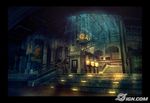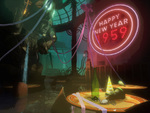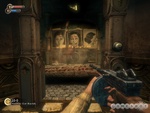Bioshock Videogame Review

Bioshock
2K Games
$19.99
PC, XBOX 360, PS3
Caution: This review contains difficult themes and spoilers.
If I could choose one word to describe Bioshock, it would be disturbing. I mean that very deliberately. After I finished playing the game for the first time, I actually felt kind of dirty. By this, I don't mean that the game actively promoted violence or that it is going to turn children into homicidal maniacs. I simply mean that it protrayed an awful situation with frankness and fidelity, and I found that the experience was sufficiently real that I felt a little ill. There was nothing cartoony about it, just gritty realism. Not all 'M' ratings are created equal; Bioshock deserved it's rating. That being so, if I had kids, I would not let them play this game. Half-Life 2 has an M, but I would let a 16-year-old play that game. The minimum age for this game might well be 25.
Let me back up. Bioshock is a first person shooter (FPS), a genre of which I have played a great deal. In fact, I have probably wasted enough time on first person shooters to cure cancer or discover cold fusion. As game types go, this kind often relies on fast reflexes and makes for a particularly immersive experience, since the game attempts to show everything exactly as the character sees it. Bioshock is an FPS that eschews cut-scenes entirely, in favor of maintaining the illusion. Like Half-Life, the protagonist also never speaks, unless one counts grunts of pain. In this game, this technique works well, because Bioshock also allows you to choose your path. Cut-scenes with dialogue would make this more tricky. Jack's silence is your freedom.
Bioshock begins in media res, with a plane crash in the middle of the Atlantic. Jack, our point of view for the game, surfaces near the entrance to Rapture, a city built far beneath the sea. Rapture is strikingly beautiful. Despite the game being set in 1960, Rapture is constructed in an Art Nouveau or Art Deco style throughout.

This style fits the city, and the story, perfectly. Part of the reason may be the creator of Rapture, Andrew Ryan. Ryan is pretty clearly intended to be the archetype of the kind of character Ayn Rand created for her novels Atlas Shrugged and The Fountainhead. When you are descending to the seafloor to enter the city, a video is played for you in which Ryan explains why he created a city on the bottom of the sea. He wanted to be free of the artificial constraints imposed by governments and religions, so he fled beyond their influence, in order to create a city where a man truly earns his bread by the sweat of his brow. This brief video is masterfully done, and it encapsulates the perennial appeal of Rand's work. "No Gods, No Kings, Only Man."
By one of those strange coincidences, shortly after I played this game some spirited discussion of Rand's life and work appeared on websites I frequent, providing plentiful fodder for this review. I take Bioshock to be a fictional commentary on the kind of world that would result from a serious attempt to create a new society on Objectivist principles. I actually read a plot synopsis that insisted that this could not possibly be the case, because things occured in Rapture that were not in accord with Objectivist principles. I take this objection as seriously as the one that claimed that the USSR had nothing to do with real Communism, because real Communism was never implemented there. Bioshock asks a much more interesting question, which is what would happen if we tried to follow Ayn Rand's ideas given the way that we actually are?
Bioshock's answer is: straight into the Hell Rand did not believe in. This becomes apparent as soon as you step out of the bathysphere. You see a deserted and devastated city, littered with placards of protest and the detritus of street fighting. Just exactly what happened here is something that only gradually becomes clear. Much of the story of the game is told by means of audio diaries that lie scattered around the city. By means of these diaries, the city's swift descent into madness is chronicled from the points of view of a small cast of major players, plus a few random souls who found themselves trapped as the situation deteriorated. Rapture actually ran well for over a decade. Ryan completed the city shortly after the Second World War. For a time, everything worked as planned. Ryan attracted the best and brightest the world had to offer. Science in particular benefitted from the freedom of Rapture. Genetics was advanced to a level where new abilities could be purchased from a vending machine. Unimaginable wealth and power were available to the gifted.
However, there was one small problem. What about everyone else? Even in Rapture, some people were smarter than others. This is a difficulty for Rand. Her supermen are often generous, such as Ragnar the pirate. However, there really is no good reason for them to support the truly pitiful and worthless, given that while Rand repeats Kant's dictum that every person be treated as an end, not a means, that does not mean for Rand that they have a claim to part of your surplus. As Rapture's other leading industrialist, Frank Fontaine says,
These sad saps. They come to Rapture, thinking they're gonna be captains of industry. But they all forget that somebody's gotta scrub the toilets. What an angle they gave me- I hand these mugs a cot and a bowl of soup, and they give me their lives. Who needs an army when I got Fontaine's Home for the Poor?
This conflict is the proximate cause of the fall of Rapture. The poor and disenfrancised rise up against Ryan, led by a revolutionary named Atlas. This uprising starts on New Year's Eve, thus illustrating a theme of Bioshock not often emphasized: millennialism. New Year's Eve is a symbolic Millennium. On that day, the old year dies, and the rules that normally bind us are temporarily suspended. Thus the custom of wild parties at the end of the year.

One of the first places you come across in Rapture is the shattered shell of a nightclub that was bombed that fateful New Year's Eve. Throughout the rest of the game, one finds the some of the few remaining living residents of Rapture still wearing their masks from the party that shattered their world.
Shattered is the only world that can apply, because Rapture never recovered from that day. Complete madness did not set in immediately. For a time, life and business continued as usual. However, Rapture had experienced an introductory apocalypse, and the Millennium was upon them. In the Time of Troubles leading up to the New Year's Eve party, Ryan had eliminated his chief rival, Fontaine, in a fiery shootout. Fontaine's crime was never quite laid out specifically, but one finds crates of Bibles and cruxifixes in Fontaine's businesses and held as evidence in the police station. Whether Fontaine was using religion as a cover or that was actually what he was smuggling is never explained. It may actually be both, since Fontaine was in the business of providing hope to the hopeless, an underserved market in Rapture. Ryan does go to the trouble of crucifying a man caught with Bibles for the benefit of the public, however. After the nightclub bombing, Ryan cracked down on the dissidents, and relegated them to a ghetto. Those who attempted to escape were summarily executed.
This kind of brutality really is directly contrary to what Rand meant, thus seemingly pointing to the conclusion that Rapture really needed more Objectivism, not less. Rand rejected any use of force that was not direct self-defense. However, the problem is that Ryan saw religion as a threat to his Objectivist ideals, and correctly perceived that a religiously grounded public order would mean that Rapture would become like the outside world. Thus religion was in fact a threat to his city, and he responded in kind. Rand never really thought this sort of thing through, because she was not really a rigorous thinker. An imaginative one, to be sure, and very gifted. However, lacking a formal education in philosophy, she never truly engaged the classical tradition she thought she was preserving, or any serious criticism. Rand was as completely modern as the collectivists she fought against, and shared much more with them than with Aristotle.
Ryan's reaction, or over-reaction, to a challenge to the principles of his city is thus clear. But what happened to everyone else? Whatever their initial sympathies in the conflict between Atlas and

Ryan, the residents of Rapture eventually simply turned on one another. All throughout the city one finds barricades and spent shells. And bodies. Everywhere. Not simply cut down and left in the streets, but increasingly the violence seems to have turned into depravity, with the citizens of Rapture beginning to prey upon one another because they enjoy it. It is particularly chilling that the medical professions in Rapture were often at the forefront of this switch. That was perhaps one of the most disturbing aspects of the game: the sheer volume of violent death that was depicted. If you can see that and not feel something, you have no heart.
The genetics research that marked Rapture is the strategic enabling technology in all this. Millennialism by itself is capable of causing things like that happened in Rapture, but part of what makes Millennialism work is that it relies upon the kinds of stories we tell ourselves to make sense of the world. What was the story of Rapture? Rapture was very much intended to be a fresh start for humanity, free from the influences that had corrupted men on the surface. Thus Rapture was a kind of New Jerusalem, a promised land where all wrongs would be righted. Along with a new heaven and earth comes a new man, the man created by splicing. The powers that were granted by the genetic technology of Rapture increased the power of the citizens, but did not improve their characters. How much easier is it to kill a man when all you have to do is think it? Like the millenarian episode in Münster in 1534-35, without the iron wills at the top enabling all the madness, the conflict between the haves and the have-nots could never have escalated that far.
Some of the scientists who immigrated to Rapture had been employed on all sides of the Second World War, and they used the freedom of Rapture to perfect genetic modification using a substance called 'ADAM' isolated from a sea slug. ADAM makes genes more malleable, allowing greater changes to them than would otherwise be possible. All life on Earth shares a substantial fraction of their genes. Things that work tend to be conserved, because small changes in critical proteins can easily be disastrous. Thus your genes are not designed to be easily malleable. ADAM changes that, but at a price. The use of ADAM allows gene splicing, but also promotes mutations and disfigurement. More ADAM can be used to offset these side-effects, but this quickly leads to a vicious spiral. Thus, everyone in Rapture soon needed ADAM.
ADAM is produced by implanting the sea slugs into little girls, creating a symbiotic bioreactor referred to as a Little Sister. This was another point of contention between Ryan and Fontaine, because Fontaine used his orphanages to produce ADAM, while Ryan produced many of the plasmids and gene tonics that did the actual modifications. Thus, they needed each other, but hated each other. Ryan solved this problem by taking over Fontaine's businesses after he had Fontaine killed. Then Ryan had a complete monopoly. Ryan also turned the conflict between him and Atlas to business purposes, because one of the resident mad scientists discovered that ADAM could be recycled from the dead. Thus Ryan actually benefitted from feeding the conflict in Rapture.
This is where your primary moral dilemma in Rapture arises. When you come to Rapture, the little girls have been freed from their orphanage, but not from bondage, because they are employed by Ryan to harvest ADAM from the casualties of war. However, the girls can be harvested themselves by the depraved citizens, so they are protected by massive armored men, Big Daddies, who accompany them everywhere. In order to protect yourself in Rapture, you must collect ADAM yourself, but the only way to do so is to eliminate the Big Daddies and capture the Little Sister. Then you are presented with a choice, save, or harvest? The maximum amount of ADAM is gained by killing the little girl, but they can actually be freed from their bondage thanks to the efforts of a mad scientist with a guilty conscience.
As it turns out, this is the only choice you really have, because your presence in Rapture is not an accident. Jack turns out to be the child of Andrew Ryan, part of an elaborate plot by Fontaine to kill Andrew Ryan, and take control of Rapture. The same genetic technology that allowed scientists to grant new abilities allowed Fontaine to create a man who could be entirely bent to his will, with the added bonus of growing up very quickly. Jack is the ultimate test tube baby, as well as ultimate weapon. For Andrew Ryan had chosen to key control of the city to his DNA, but didn't bother to make it accurate enough to distinguish between him and close relatives.
Andrew Ryan actually discovers Jack's true provenance before you do, and in a final display of the willfulness that made Rapture come to be, actually uses Jack's conditioning to force you to kill him, telling you, "A man chooses, a slave obeys!" The game is thus clearly structured around the choices that we make, and who that makes us. Surprisingly (for me), this really is not the typical namby-pamby "it is good because you chose it!" kind of thing, but rather a very meaty illustration that you can choose right or wrong, and that if you do choose wrong, what usually happens is that you benefit while someone else suffers. This is told through the fate of the Little Sisters.

You can progress pretty well through the game with either choice, to save the innocents, or to sacrifice them, but the ending makes the personal consequences of evil very clear. You become an unadulterated monster, worse than the men who ruined Rapture. I admired the frankness of this, in many games it is now possible to choose "good" or "evil" but mostly this comes down to what color your hat is rather than some fundamental difference in what it means to be human. Sometimes there is a real "evil" ending, but it more along the lines of saturday morning cartoons than anything interesting. Bioshock was different, and that is why I found it so fascinating.
I saved the little girls.
Images Copyright © 2K Games 2007



Comments ()